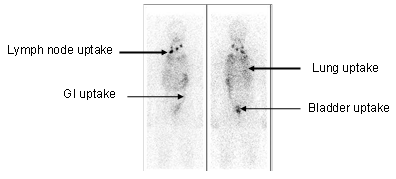On Tuesday, I had my post-RAI blood draw, and then on Wednesday, I had my big Whole Body Scan (WBS). I got to UCLA Santa Monica at around 7:30am, and waited a bit before getting in.
The whole scan took 35 minutes. I just lied there, trying not to fall asleep, as the machine did its thing. The scanner pretty much came within about an inch of my face. I don't tend to get claustrophobic, but it definitely took a few minutes to get used to it.
"I'm not touching you! I'm not touching you!"
The scanner spent about 10 minutes at the positive you see above, and then it slowly, millimeter by millimeter, started moving down toward my toes, with robotic whizzing and whirring sounds going on the whole time. I could hear the nurses moving around while the scanner was going, and could see them in the corner of my eye sometimes, but I wasn't allowed to move, so I just had to sit there in awkward silence.
It finished up, the nurse shook my hand, and I went home. That was it. They didn't share the results with me, even though I had heard that some people get the results immediately. Oh well, no one was expecting any surprises, so I thought nothing of it and went on with my life.
On Thursday morning, my quarantine was lifted! While I had been eating meals with my parents, I had been limiting my total time with them each day to about an hour, for their safety. But Thursday morning was the end of it all. I went to see Ant-Man with my mom, which was fun. The next day I took her to see Mission Impossible: Rogue Nation, which was pretty solid.
I heard Tom Cruise filmed this stunt without any wires.
I spent the weekend with family, celebrating my cousin's birthday. One of my cousins even gave me this pin:
Mini Thyroid!
It was from a company named I Heart Guts, which makes cute little merchandise based on body organs. It's pretty hilarious, I highly recommend it (iheartguts.com)!
I returned to work yesterday (Monday), getting caught up on the work that I missed. However, the biggest news came in the afternoon, when I got a message from my endocrinologist:
"The result was as expected - residual tissue in the thyroid bed which always remains after surgery, and no distant metastases."
Woohoo! But wait, what does it all mean? Well, allow me to explain.
The whole body scan works to detect where any remaining radioactive iodine is in the body after taking the RAI. It produces an image, showing the location of any remaining radioactive iodine.
The one place you would expect to see light up would be the "thyroid bed," which is the location of where the thyroid used to sit. This is because it is impossible for a surgeon to remove 100% of all thyroid tissue. It would be too difficult to do so without compromising the other structures in the neck (vocal chord nerves, parathyroid glands, muscle, etc.). Therefore, the RAI goes straight to any remaining tissue there and works over several months to kill off what is left.
Other places that can light up during this scan are areas of the digestive tract, the salivary glands, and the bladder. The digestive tract takes a hit (although hopefully minimal) since this is where the RAI pill first went when you take the dose. The salivary glands are also obviously affected, since I've mentioned before that they can take up some of the RAI. The bladder is also expected to show some traces, since as I've mentioned in previous posts, almost all of the excess RAI that is not taken up by thyroid cells is excreted through urine.
A clean RAI scan could look something like this:
Note: Sample from internet, NOT my scan.
What you're hoping not to see from these scans is metastasis to other organs. The most common locations for metastasis are lymph nodes, lungs, and bones.
Sample scan shows lymph nodes and lungs "lighting up," which is no bueno.
However, while you don't want metastasis, it's not necessarily the worst thing in the world in many cases. This is where the whole "thyroid cancer is the most forgiving" phrase can be a good thing.
If thyroid cancer metastasizes to a distance location, like the lungs for example, it does NOT become lung cancer; it is simply metastatic thyroid cancer in the lungs. They are cancerous thyroid cells that moved into the lungs, and the treatment would still be radioactive iodine. And if the lungs light up during the scan, then it means that the RAI found the thyroid cells, and are now actively working to kill them.
Obviously, metastasis is scary, and there are exceptions when the RAI isn't able to attack them, but for most people, the RAI is sufficient. Maybe a second dose is needed down the line, but had my lungs or other distant organs shown signs of metastasis, the treatment plan would have been to wait 6 months for the RAI to do its job, and then re-scan.
However, I got the ALL CLEAR!
Thanks, Captain Solo.
To be honest, the news is almost a bit anti-climactic. As arduous and challenging as this journey has been so far, I guess I thought getting this message would make me break out into song and dance.
J. C. V. D.
But I guess I just feel more...content? Relieved? Not sure what the word is.
Perhaps it's because thyroid cancer is one of the peskiest cancers around, with an overall recurrence rate between 20-30%. However, statistics that I've seen online for Stage 1 has a recurrence rate more like 2-5%, so I'm probably in the clear. So maybe I'm trying to prepare myself for the long haul?
I guess I've started to reflect on everything that's happened to me, all of the ups and downs, all of the support that I've gotten from family, friends, co-workers, and even strangers. Maybe this is the proverbial shock that comes after experiencing something crazy, and everything will start to hit me later on. In any case, I believe a celebration is in order.
I'm sorry, Charlie Murphy.
Going forward, I'll have blood tests and ultrasounds to monitor everything and make sure that it doesn't come back. For the first year, the tests will be every 3 months. I think the standard is about 5 years of monitoring before a doctor is willing to say the word "cured."
I'll write more about blood tests and what to look for in results down the road. But for now, "remission "is the word, I guess.
-W
I can't wait for Paul Blart 3: Rogue Nation.









No comments:
Post a Comment